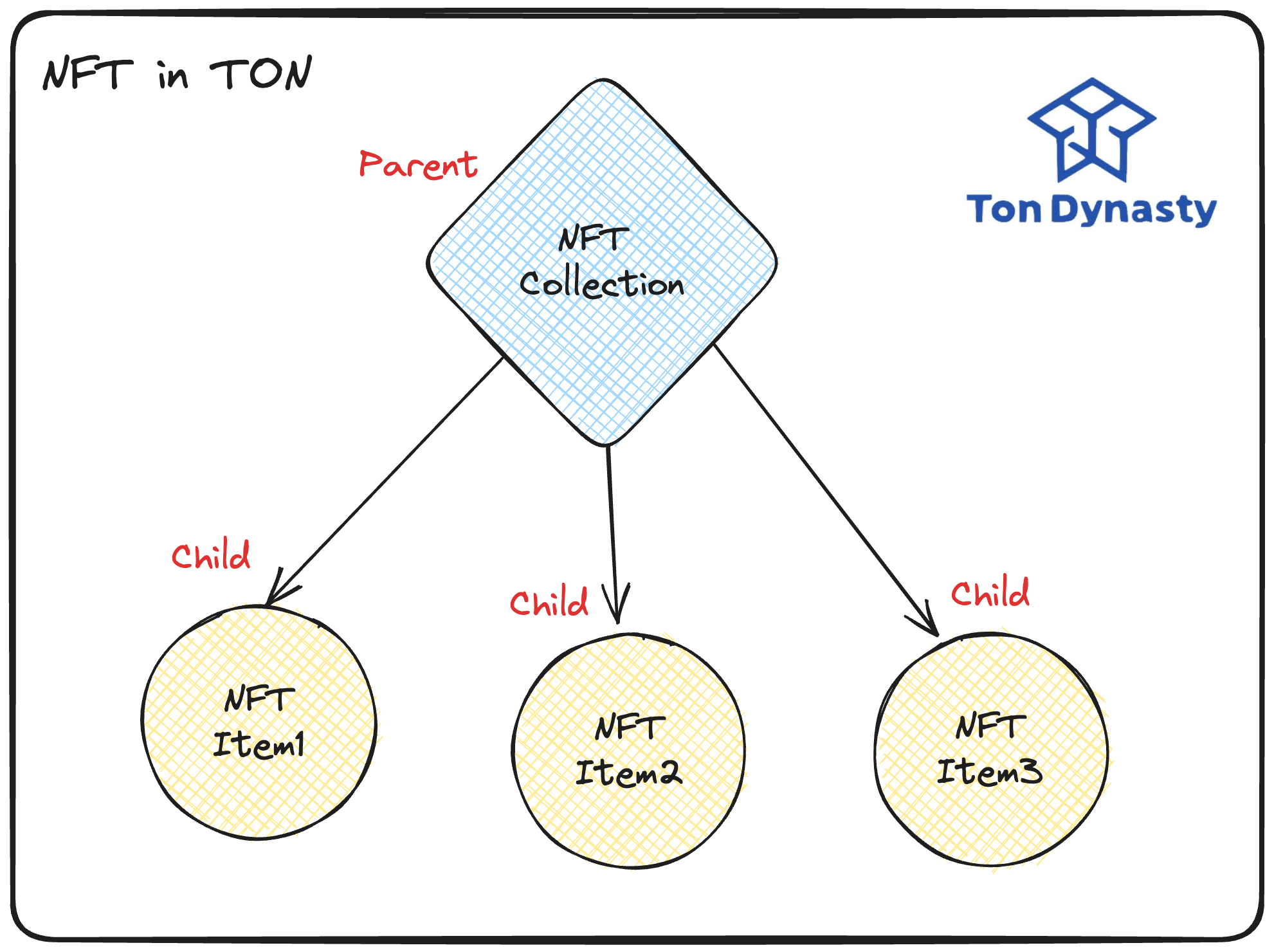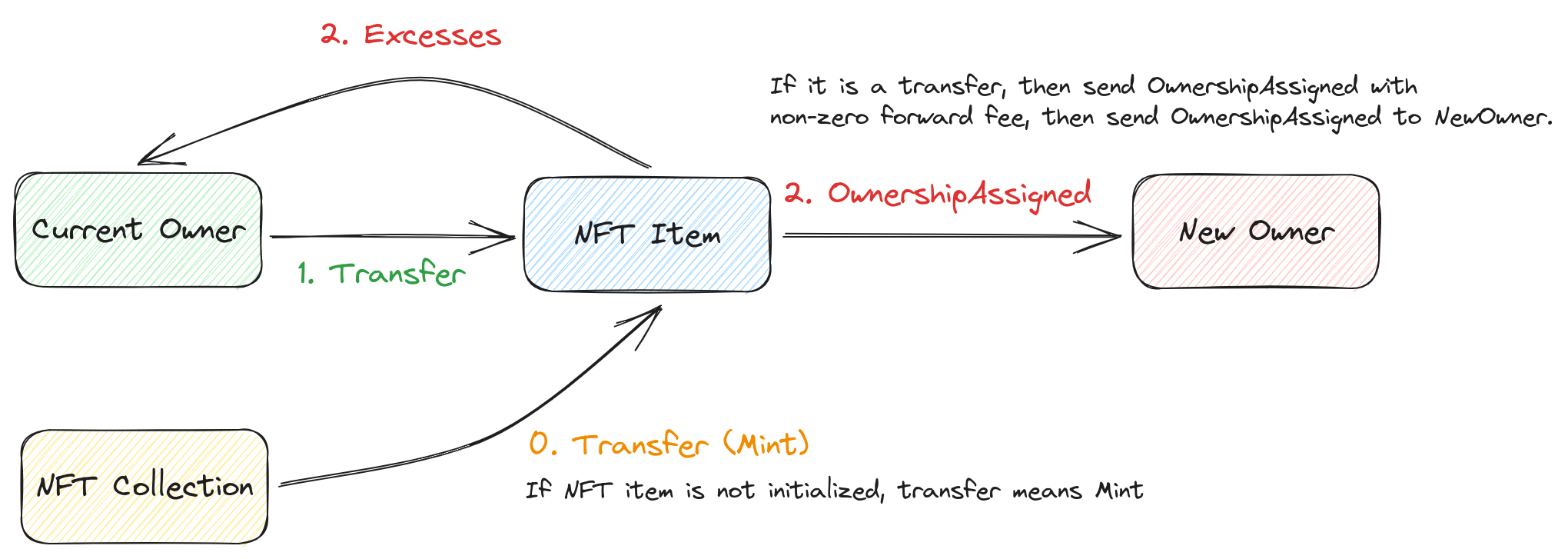NFT Collection
This NFT Collection smart contract provides a framework for NFT collections that comply with the TEP-0062 standard.
NFT in TON follows parent-child pattern. That is, each NFT item is a child contract of the NFT collection contract.

Overview
In the TEP-0062 standard, each NFT collection is associated with an NFT Collection smart contract, which stores basic information about the collection, including the next item index, collection content, and owner address.
Message Flows

Specifically, the Transfer flow is as follows:
- When NFT Item received a
Transfermessage, it will set the current owner to thenewOwnerin payload ofTransfermessage. - Then, an OwnershipAssigned event will send to NewOwner as a notification.
- Last, if there are remaining funds, the NFT Item will send
Excessesmessage to previous owner, attaching with the remaining funds.
CollectionData Structure
struct CollectionData {
next_item_index: Int; // collection should issue NFT with sequential indexes starting from 1. -1 value implies non-sequential collections.
collection_content: Cell; // collection content format should comply with TEP64
owner_address: Address; // collection owner address, zero address if no owner
}
NFTCollectionStandard Trait
contract ExampleNFTCollection with NFTCollectionStandard, NFTRoyaltyStandard, Estimatable, Deployable {
next_item_index: Int as uint32 = 0; // if next_item_index is not -1, means sequential minting is enabled. We want a sequential minting in this example so we set it to uint32.
collection_content: Cell; // collection_content may be the prefix of individual_content
owner_address: Address; // owner_address is the address of the owner of the collection
royalty_params: RoyaltyParams; // royalty_params is the params of royalty
init(owner_address: Address, collection_content: Cell, royalty_params: RoyaltyParams) {
self.owner_address = owner_address;
self.collection_content = collection_content;
self.royalty_params = royalty_params;
}
// @dev Mint is not the standard function of NFTCollection, so we need to define it by ourselves
receive("Mint") {
let ctx: Context = context();
let nftItemInit: StateInit = self._get_nft_item_state_init(self.next_item_index);
send(SendParameters{
to: contractAddress(nftItemInit),
value: self.estimate_rest_value(ctx),
bounce: false,
mode: SendIgnoreErrors,
body: Transfer {
query_id: 0,
new_owner: ctx.sender,
response_destination: ctx.sender,
custom_payload: emptyCell(),
forward_amount: 0,
forward_payload: emptySlice()
}.toCell(),
code: nftItemInit.code,
data: nftItemInit.data
});
self.next_item_index = self.next_item_index + 1;
}
// @dev _get_nft_item_state_init returns the initCode of NFTItem
override inline fun _get_nft_item_state_init(index: Int): StateInit {
return initOf ExampleNFTItem(myAddress(), index, self.owner_address, self.collection_content);
}
}
Internal Functions and Get Methods
Internal Functions
_get_nft_item_state_init(index: Int): StateInit
Calculates the initial code for the NFT item contract by item index. This function MUST be overridden in a custom contract.
abstract inline fun _get_nft_item_state_init(index: Int): StateInit;
_get_nft_content(index: Int, individual_content: Cell): Cell
Gets the serial number of the NFT item of this collection and the individual content of this NFT item, returns the full content of the NFT item in a format that complies with standard TEP-64.
// @dev _get_nft_content gets the serial number of the NFT item of this collection and the individual content of this NFT item.
// returns the full content of the NFT item in format that complies with standard TEP-64.
// @note one MUST override this function to provide full NFT item content
virtual inline fun _get_nft_content(index: Int, individual_content: Cell): Cell {
let builder: StringBuilder = beginString();
let idvStr: String = individual_content.asSlice().asString();
builder.append(idvStr);
return builder.toCell();
}
_get_collection_data(): CollectionData
Returns NFT collection data.
// @dev get_collection_data returns nft collection data
virtual inline fun _get_collection_data(): CollectionData {
let builder: StringBuilder = beginString();
let urlPrefix: String = self.collection_content.asSlice().asString();
builder.append(urlPrefix);
builder.append(self.NFT_COLLECTION_STANDARD_METADATA);
return CollectionData {
next_item_index: self.next_item_index,
collection_content: builder.toCell(),
owner_address: self.owner_address
};
}
Get Methods
get_collection_data(): CollectionData
Retrieves collection data.
get fun get_collection_data(): CollectionData {
return self._get_collection_data();
}
get_nft_address_by_index(index: Int): Address
Gets the address of the NFT item of this collection by its serial number.
// @dev get_nft_address_by_index gets the serial number of NFT item of this collection and returns its address
get fun get_nft_address_by_index(index: Int): Address {
let initCode: StateInit = self._get_nft_item_state_init(index);
return contractAddress(initCode);
}
get_nft_content(index: Int, individual_content: Cell): Cell
Calls _get_nft_content and returns the full content of the NFT item in a format that complies with standard TEP-64.
// @dev get_nft_content calls _get_nft_content and returns the full content of the NFT item in format that complies with standard TEP-64.
get fun get_nft_content(index: Int, individual_content: Cell): Cell {
return self._get_nft_content(index, individual_content);
}
Usage
Basic Usage
To utilize the NFT Collection Standard, you need to implement an NFT Collection contract and override essential methods like _get_nft_item_state_init and _get_nft_content.
// Your contract should look something like this
contract YourNFTCollection with NFTCollectionStandard {
// ... your custom properties and methods ...
override inline fun _get_nft_item_state_init(index: Int): StateInit {
// ... your implementation ...
}
override inline fun _get_nft_content(index: Int, individual_content: Cell): Cell {
// ... your implementation ...
}
}